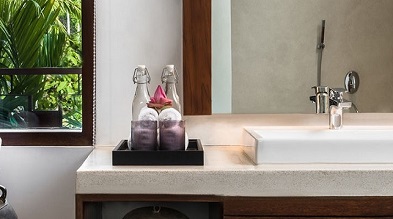 SIEM REAP, CAMBODIA—Early last year, Christian de Boer, Managing Director of Jaya House River Park, a 36-room hotel in Siem Reap, Cambodia, launched a campaign to get businesses throughout the region to offer refillable aluminum water bottles instead of disposable plastic ones. The campaign, called Refill Not Landfill, has already avoided the placement of 1.2 million plastic bottles into Cambodia’s waste stream. More than 40 members of Siem Reap’s hospitality and tourism industries and development sector have joined ReFill Not Landfill.
SIEM REAP, CAMBODIA—Early last year, Christian de Boer, Managing Director of Jaya House River Park, a 36-room hotel in Siem Reap, Cambodia, launched a campaign to get businesses throughout the region to offer refillable aluminum water bottles instead of disposable plastic ones. The campaign, called Refill Not Landfill, has already avoided the placement of 1.2 million plastic bottles into Cambodia’s waste stream. More than 40 members of Siem Reap’s hospitality and tourism industries and development sector have joined ReFill Not Landfill.
Key to the success of the campaign is a sophisticated way to show bottle users where they can fill up their bottles—a QR code placed on each bottle. The back of the bottles also features the names of all the free-of-charge water refill locations across the city. There are now 85 locations in Cambodia where tourists can go for bottle fill-ups. Outside of Cambodia, there are hundreds more locations.
“Refill Not Landfill is solely aimed at the tourism industry,” de Boer says. “It is a start. It is the beginning of change. It really is so simple.”
The campaign has gained momentum as more and more businesses participate, and an increasing number of water refill stations are identified. From an initial launch location in Siem Reap, the program has expanded to other cities in Cambodia, as well as Laos, Vietnam and Myanmar.
Travelers Expect Clean, Pure Water
In Cambodia, water is not typically consumed from the tap. That is why it is important to know where refill stations are. It is typical to offer purified water to visitors. At Jaya House River Park, a reverse osmosis system is used to purify water. In guestrooms at the property, water is offered in refillable glass bottles.
Jaya House River Park has partnered with Coola-Products for its bottles. At first the aluminum bottle cost $9 each but by joining with other local businesses de Boer has gotten the price down to a more reasonable $3.10. The cost of a room night at Jaya House River Park has been increased $1 to cover the cost. A typical guest stay is several nights. “It has brought revenue to participating hotels,” de Boer says.
The Jaya House River Park’s Managing Director says he does not believe the plastic bottle pollution problem in Cambodia is necessarily worse than anywhere else. Globally, plastic has become a plague on the planet, killing wildlife, choking seas, and filling landfills for centuries to come. Few bottles are recycled as the facilities for doing so are virtually non-existent within Cambodia and the resources for transporting them to neighboring countries are informal and limited. Even in developing countries with formal infrastructure, such as the United States, as little as 23 percent of the plastic bottles sold end up being recycled. In Cambodia, they end up in landfill or blown around the countryside, which struggles under drifts of plastic discards along roadways, in rice fields and gardens, and along watercourses which often become blocked creating flooding and other damage.
One refillable aluminum bottle can last up to four years or more. Even assuming a life span of just three years, a single bottle can replace as many as 4,380 plastic bottles. The Refill Not Landfill campaign has already received orders for 65,000+ bottles, and rising, representing a potential saving of 175,200,000 plastic bottles over the next four years.
The Jaya House River Park’s de Boer says he has always been vocal about other people doing something but this time he acted. “I cannot control the world, but I can control my world,” he says.
Glenn Hasek can be reached at editor@greenlodgingnews.com.






